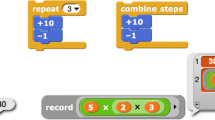Abstract
This contribution advocates designing programming lessons in a way that students use information and communication technology (ICT) extensively. The paper presents four examples of such ICT-rich programming projects with different levels of required programming expertise: 1) Write directions for walking from one place to another using Google Maps and Streetview; 2) Develop a Python program that creates a text using words and phrases from free literature; 3) Write a program that creates a list of words representing controversial issues from automatically generated interview transcripts; and 4) Create a program that analyses a comma-separated values (csv) file with the results of a self-made Google Forms survey. The examples illustrate benefits of the combination of ICT and programming: students discover new ICT functionality and get a deeper understanding of digital technology. They experience that programming knowledge empowers uses of digital technology in new ways. Having the opportunity to use ICT tools may motivate teenagers to go deeper into computer science.
Access this chapter
Tax calculation will be finalised at checkout
Purchases are for personal use only
Similar content being viewed by others
References
Webb, M.: Computer science in K-12 school curricula of the 2lst century: why, what and when? Educ. Inf. Technol. 22(2), 445–468 (2016). https://doi.org/10.1007/s10639-016-9493-x
Computer Science Teachers Association.: CSTA K-12 Computer Science Standards, Revised 2017. https://www.csteachers.org/page/standards. Accessed 29 Sept 2019
Brinda, T., Puhlmann, H., Schulte, C.: Bridging ICT and CS: educational standards for computer science in lower secondary education. ACM SIGCSE Bull. 41(3), 288–292 (2009)
Dagienė, V.: Challenge to Promote Deep Understanding in ICT. Paper presented at the 6th IFIP World Information Technology Forum (WITFOR), San José, Costa Rica, pp. 47-52 (2016)
Bell, T., Witten, I., Fellows, M.: Computer science unplugged. Department of Computer Science, University of Canterbury, Christchurch, New Zealand (2002)
Greenberg, I., Kumar, D., Xu, D.: Creative coding and visual portfolios for CS1. In: Proceedings of the 43rd ACM Technical Symposium on Computer Science Education, pp. 247–252 (2012)
Peppler, K., Kafai, Y.: Creative coding: programming for personal expression. In: Proceedings of the 8th International Conference on Computer Supported Collaborative Learning (CSCL), Rhodes, Greece, vol. 2, pp. 76–78 (2009)
Wood, Z.J., Muhl, P., Hicks, K.: Computational art: introducing high school students to computing via art. In: Proceedings of the 47th ACM Technical Symposium on Computing Science Education, pp. 261–266 (2016)
Funkhouser, C.: Digital poetry: a look at generative, visual, and interconnected possibilities in its first four decades. In: Schreibman, S., Siemens, R. (eds.) A Companion to Digital Literary Studies. Blackwell, Oxford (2008)
Weigend, M.: Making computer science education relevant. In: Khalil, I., Neuhold, E., Tjoa, A.M., Da Xu, L., You, I. (eds.) ICT-EurAsia 2015. LNCS, vol. 9357, pp. 53–63. Springer, Cham (2015). https://doi.org/10.1007/978-3-319-24315-3_6
Kori, K., Pedaste, M., Leijen, Ä., Tõnisson, E.: The role of programming experience in ICT students’ learning motivation and academic achievement. Int. J. Inf. Educ. Technol. 6(5), 331–337 (2016)
Fluck, A., et al.: Arguing for computer science in the school curriculum. Educ. Technol. Soc. 19(3), 38–46 (2016)
Author information
Authors and Affiliations
Corresponding author
Editor information
Editors and Affiliations
Rights and permissions
Copyright information
© 2020 IFIP International Federation for Information Processing
About this paper
Cite this paper
Weigend, M. (2020). ICT-Rich Programming Projects. In: Brinda, T., Passey, D., Keane, T. (eds) Empowering Teaching for Digital Equity and Agency. OCCE 2020. IFIP Advances in Information and Communication Technology, vol 595. Springer, Cham. https://doi.org/10.1007/978-3-030-59847-1_2
Download citation
DOI: https://doi.org/10.1007/978-3-030-59847-1_2
Published:
Publisher Name: Springer, Cham
Print ISBN: 978-3-030-59846-4
Online ISBN: 978-3-030-59847-1
eBook Packages: Computer ScienceComputer Science (R0)





